ARAVIND SESAGIRI RAAMKUMAR1, JOHN ROBERT BAUTISTA1, TUO-YU CHEN2, MOHAMED A. SHAIK1, NEHA MALHOTRA2, YIN-LENG THENG1,2
1. Wee Kim Wee School of Communication and Information (WKWSCI), Nanyang Technological University (NTU), Singapore; 2. Ageing Research Institute for Society and Education (ARISE), Nanyang Technological University (NTU), Singapore
Corresponding to: Aravind Sesagiri Raamkumar, PhD, Research Fellow, Wee Kim Wee School of Communication and Information, Nanyang Technological University, 31 Nanyang Link, Singapore 637718; aravind002@ntu.edu.sg
Care Weekly 2018;2:57-64
Published online November 5, 2018, http://dx.doi.org/10.14283/cw.2018.14
Abstract
Background: Health and wellness coaching (HWC) has emerged as an important vocation that complements traditional primary care and caregiving services. Although prior studies have reviewed HWC scientific literature, there is an apparent lack of literature on the global HWC training programmes. In this paper, we attempt to address this gap by analysing data pertaining to HWC training programmes offered across the globe. General-purpose search engine Google was used for finding HWC training programmes in June 2018. We identified 224 relevant training programmes and the required data were manually extracted from the corresponding websites. Findings indicate that HWC training is predominant in North America, UK, and Australia, with online learning as the most used delivery mode. Certificate programmes are widely offered by training institutes and academic organisations compared to degree programmes, with only a meagre number of programmes recognized by International Consortium for Health & Wellness Coaching (ICHWC) and International Coach Federation (ICF). HWC programmes seem to be focused on training coaches to help clients primarily with conditions and ailments, such as diabetes, stress, and other chronic diseases. However, there is only a very small number of HWC training programmes on eldercare found.
Key words: Health and wellness coaching, health coaching, wellness coaching, training programmes.
Introduction
Primary care physicians provide medical care for patients through the diagnosis of health conditions and subsequent prescription of medication. However, non-adherence to prescription reduces the benefit of treatment leading to poor prognosis (1, 2). Although there are several interventions that aim to improve medication adherence (3), most interventions do not render expected outcomes (4). Moreover, although having informal care support is associated with increased medical adherence (5, 6), a previous review indicates that medical adherence interventions rarely equip informal caregivers with skills to support care recipients effectively (7).
Health and wellness coaches have the potential to address the gap between physicians and caregivers. Health coaching (HC) is an intervention through which a health coach engages with a client by listening, and observing so as to provide personalized solutions for facilitating behaviour change (8, 9). Similarly, wellness coaching (WC) is an intervention for helping people who are ill, and also those who intend to improve their general fitness (10). The International Consortium for Health & Wellness Coaching (ICHWC), previously known as the National Consortium for Credentialing Health and Wellness Coaches (NCCHWC), is a well-known organisation that sets standards for health and wellness coaching (HWC). It provides this definition: “Health and Wellness Coaches partner with clients seeking self-directed, lasting changes, aligned with their values, which promote health and wellness and, thereby, enhance well-being. In the course of their work health and wellness coaches display unconditional positive regard for their clients and a belief in their capacity for change, and honoring that each client is an expert on his or her life, while ensuring that all interactions are respectful and non-judgmental” (11). Wolever et al. (12) defines HWC as “a patient-centered approach wherein patients at least partially determine their goals, use self-discovery or active learning processes together with content education to work toward their goals, and self-monitor behaviors to increase accountability, all within the context of an interpersonal relationship with a coach. The coach is a healthcare professional trained in behavior change theory, motivational strategies, and communication techniques, which are used to assist patients to develop intrinsic motivation and obtain skills to create sustainable change for improved health and well-being.”
Motivational interviewing (MI) (13) is the key method used in HWC for assisting clients in changing their behaviour. HWC is prominently grounded in theories and models such as self-efficacy (14), transtheoretical (stages of change) model (15), and cognitive behaviour therapy (CBT) (16). The effectiveness of HWC has been reported in prior studies. For instance, a systematic review shows that HWC is a promising intervention for chronic diseases (17). Moreover, HC can improve physiological, behavioural, and psychological conditions among older adults with chronic conditions (18). HC and WC are also effective interventions for improving glycaemic control (19) and weight loss among individuals with diabetes (20). In addition to chronic disease management, WC is associated with improvements in depressive symptoms, stress, and quality of life among employees (21). A peer-delivered WC has also been shown to improve overall health (22) and can reduce inpatient health services expenditures (23).
Overall, although previous research has shown the effectiveness of HWC on improving health and wellness, to the best of our knowledge, there has been no attempt made to explore the current state-of-the-art in HWC training programmes. The aim of this paper is to sketch the landscape of global HWC training programmes through these dimensions: (1) specialisation, (2) endorsement bodies (3) target health conditions, (4) host country, (5) delivery mode and business model, and (6) programme type and institution type. The paper also intends to discuss shortcomings along with a few recommendations for future programmes.
Methods
HWC scientific literature covers papers on interventions, systematic reviews, reports, opinions, and commentaries. Therefore, academic databases are not the relevant information sources for this review since information about contemporary HWC programmes are not available in the scientific literature, unless the training institutions publish papers regarding their HWC programmes. Therefore, general-purpose search engine Google was used for collecting data about HWC programmes. Google search was performed in June 2018 using the keywords ‘health coaching’ and ‘wellness coaching’. At the end of the search sessions, 234 websites were shortlisted. From this initial list, 10 websites were removed since they were inaccessible in the web browser or had content that was unrelated to HWC. The final dataset is made available as an open access resource (24). Table 1 lists the data fields extracted from the 224 HWC programme web pages.
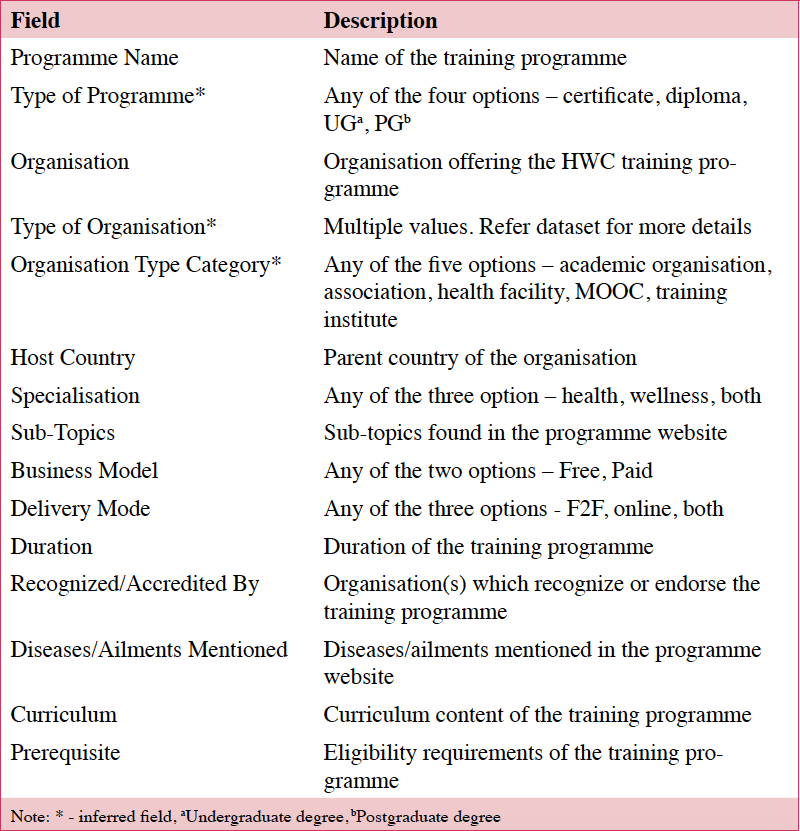
Findings
Specialisation
The majority of the programmes specialize in HWC (n = 92; 41.1%), followed by WC (n = 77; 34.4%), and HC (n = 55; 24.5%). It is hypothesized that the advent of HWC standards put forth by ICHWC (25) might have influenced training providers to integrate both HC and WC training into a single programme. Along with the specialisation, the salient topics of the HWC programmes were identified. The full list of topics per programme can be viewed in the dataset (24). These topics were identifiable only for 108 programmes. In Figure 1, the salient topics are illustrated in the form of a word cloud. The top five topics that are covered are health, psychology, coaching, nutrition and change (as in behaviour change).
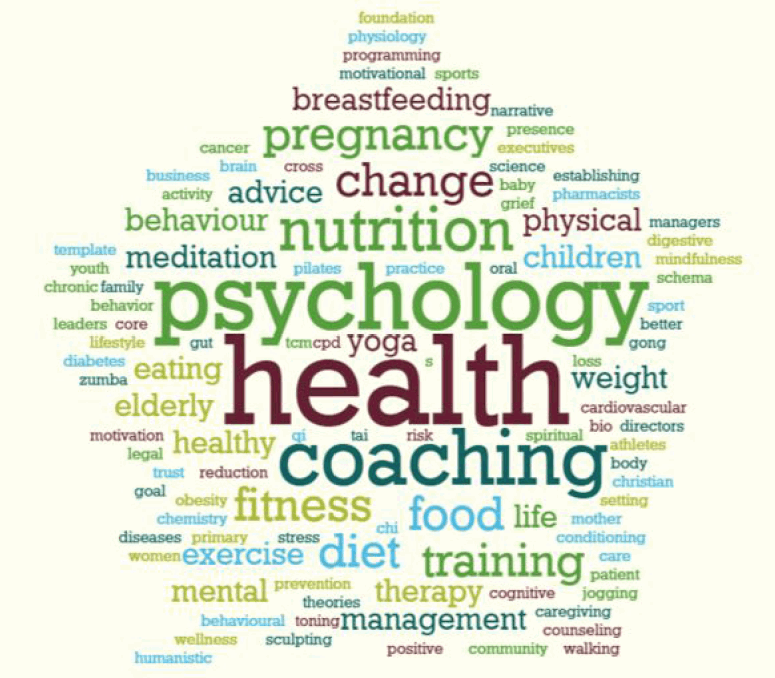
Programme Endorsement
Training programmes are required to be recognized by a regulatory body or a well-known consortium/association. This information was found for 93 programmes (41.5%). In Table 2, the bodies that recognize at least five HWC programmes are listed. ICHWC was at the top of the list, followed by International Coach Federation (ICF). The presence of the National Association of Nutrition Professionals (NANP) is expected since HWC training involves nutrition topics. The presence of the International Institute for Complementary Therapists (IICT) in this list signifies the similarities between a health and wellness coaches with that of therapists, while the presence of the American College of Sports Medicine (ACSM) indicates the role of exercise science in HWC training.
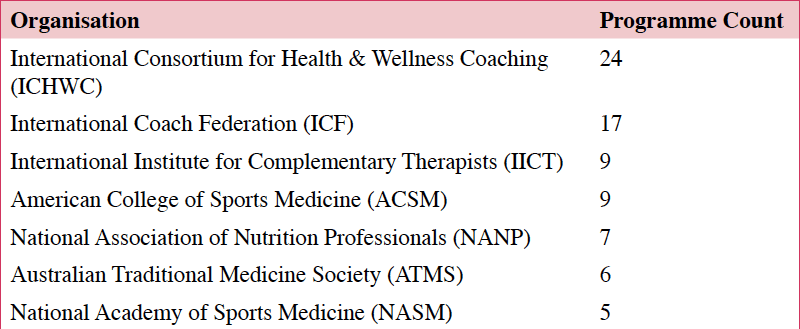
Target Health Conditions
Table 3 lists the top 10 health conditions that HWC training programmes are targeting. The presence of diabetes and obesity as the top two conditions is not surprising, as a majority of HWC scientific papers have been published on these topics (26). The majority of the programs use overarching terms, such as chronic disease, cardiovascular disease, and cancer, to describe health conditions. In the websites of the WC training programmes, health conditions were mentioned in only five of the 77 programmes. It is observed that the health conditions stress, mental health conditions and depression are mentioned mostly in WC programmes. This reinforces the perception of WC as an intervention, which is aimed at improving the general health and wellness of individuals (21).
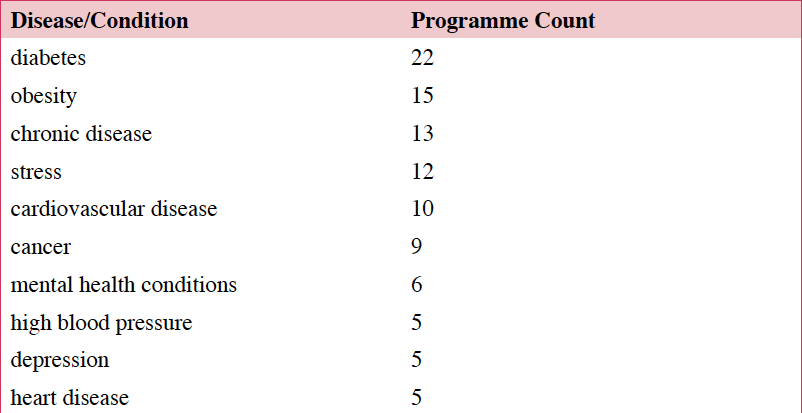
Host Country
Figure 2 displays the host countries along with the corresponding number of programmes. About 49.1% (n=110) of the programmes were offered in the USA, followed by Australia (n = 43; 19.2%), UK (n = 30; 13.4%), and Canada (n = 23; 10.3%) The limited presence of African and Asian countries could be possibly due to few reasons. First, there is a lack of sufficient preventive and palliative care services in these regions (27). Second, we are hypothesizing that HWC education could possibly be provided in the name of caregiving and health education.
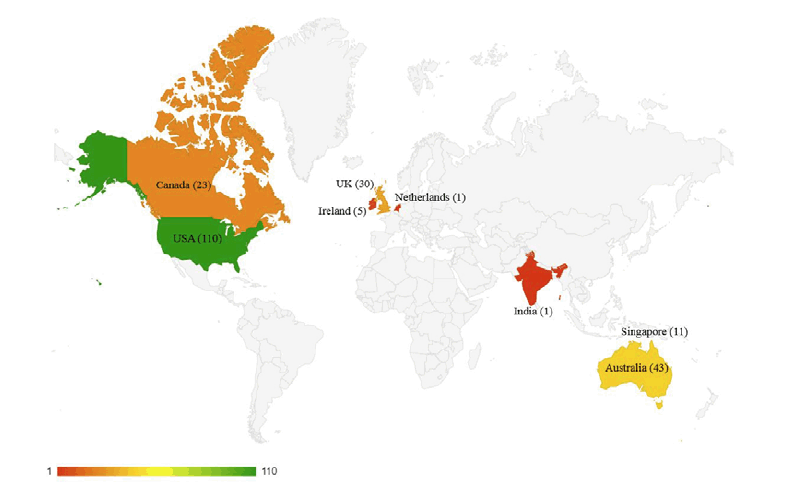
Delivery Mode and Business Model
With the emergence of e-learning platforms and massive open online courses (MOOCs), a majority of the HWC training programmes is offered through online classes (n = 95; 42.4%) as a replacement for the traditional face-to-face (F2F) classroom programmes (n = 77; 34.4%). The online programmes often provide materials and some also have teleconference sessions (28). There are also programmes that combine F2F and online training (n = 52; 23.2%). It can be stated that the business model of a training programme has a connection to the delivery mode. The business model in this context refers to the pricing model adopted by the training provider, such as that the programme is offered free of charge or the provider charges a training fee. Only four (1.8%) of the 224 programmes are classified as free programmes since the programme content can be accessed free of cost. Two of these programmes are MOOC courses offered by Doane university through edX (29) and the Institute for Wellness Education (IWE) through Canvas network (30). Liberty University offers a free course through iTunes (31) and Health Coaches International offers a free webinar (32).
Programme Type and Institution Type
The programme type decides the expected qualification level of a participant enrolled in a training programme. The programme type could be a certificate, diploma, undergraduate degree or postgraduate degree. The type of the institution often decides the programme type. Figure 3 shows the frequency of programme type per institution type. Among the programme types, certificate programmes account for 86.2% (n = 193) of the total HWC programmes. In addition, there are 16 diplomas, six undergraduate, and nine postgraduate degree programmes. From this data, it can be ascertained that HWC education is primarily offered as a certificate programme so that participants could use the training to subsequently apply for ICHWC and/or ICF certification.
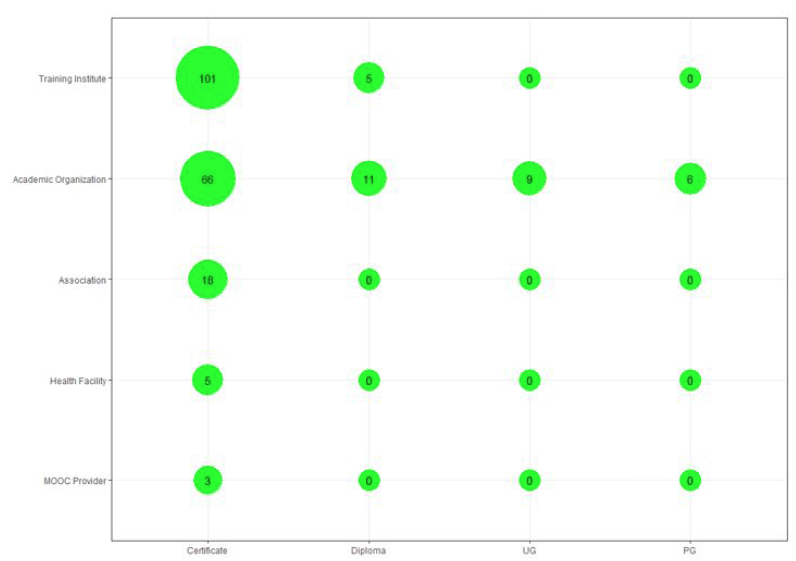
Five institution types are identified. They are (1) training institutes, (2) academic organisations, (3) associations, (4) health facilities, and (5) MOOC providers. Training institutes are the institutions that offer certificate and diploma programmes while academic organisations encompass universities, colleges, and schools that offer all four programme types. Associations are membership-based organisations, which provide services to a specific group(s) of people. For example, International Association of Health and Nutrition Coaches (IAHC) is one such association for health coaches. Health facilities are organisations that include hospitals, clinics, and other healthcare facilities. MOOC providers are not essentially institutions by itself but this type was added to differentiate itself from other types. The majority of the HWC programmes are offered by training institutes (n = 106; 47.3%), followed by academic organisations (n = 92; 41.1%). The three MOOC programmes are offered in edX (29), Udemy (33, 34), and Canvas network (30).
Discussion
The specialisation split-up in the HWC training programmes indicates that many institutions promote their programmes as HWC instead of basic HC or WC. Correspondingly, 54% of HWC programmes had listed a recognition body in their websites while only 25% of HC programmes and 38% of WC programmes listed a recognition body. Therefore, there are more HWC training programmes endorsed by regulatory bodies, in comparison to basic HC and WC programmes. It is to be noted that the ICHWC has put forth training standards and certification guidelines for HWC (25, 35). The ICHWC also provides approvals for transition (36) and continuing education (37) programmes. In addition, it also provides the necessary guidelines for National Board Certified Health & Wellness Coach (NBC-HWC) certification and hosts the certified health and wellness coaches’ directory (38).
Based on our findings, there are only 24 HWC programmes that have included ICHWC recognition/accreditation information on their website. Training institutions must comply with the official requirements of ICHWC to get their programme recognized. For instance, ICHWC guidelines (39) states that a minimum of 75 hours of training and education covering health and wellness coaching topics are required. There are about 35 programmes where the number of training days is not more than five. These programmes can be considered either foundational programmes or programmes with a specific focus on HWC sub-topics. The participants receive a course completion certificate after completing such programmes. In addition to ICHWC certification, coaches could also apply for the International Coaching Federation (ICF) certification. Currently, 17 HWC programmes are recognized by ICF through Accredited Coach Training Program (ACTP) or Approved Coach Specific Training Hours (ACSTH) or Continuing Coach Education (CCE) designations. It is unknown whether HWC trainees attempt to clear both ICHWC and ICF certifications before beginning their coaching practice.
In terms of geographical distribution, HWC programmes are currently popular in North America followed by Australia and UK. This representation can be correlated with the Universal Health Coverage (UHC) index prepared by the World Health Organization (40). The UHC index measures the coverage of essential health services in a country, in the range of 0 to 100. The countries which have a high number of HWC training programmes tend to have high UHC index values (>80). Therefore, there is a semblance of a positive correlation between UHC index and the number of HWC training programmes for countries. Besides, these countries also have a high density of healthcare professionals (>80 per 10,000 population) (41). In contrast, the introduction of health and wellness coaching as part of the healthcare system in developing countries continues to be a challenging proposition due to the scarcity of healthcare professionals. Perhaps, the case of Medicare paying community health workers for taking up HC (42) could be considered as a case study for introducing HWC as a lucrative profession (not only as a vocation) in developing countries.
It is reiterated that HC involves the use of communication techniques such as motivational interviewing so that health improvements goals could be achieved (43), while WC also deals with the use of effective communication (44). Hence, HWC involves understanding the psychology of clients. Naturally, the key topics highlighted in HWC programmes are health, psychology, coaching, nutrition and change. Majority of HWC literature deals with nutrition, fitness and weight loss (12), therefore the topics diet, fitness and food were apparent. Interestingly, there are few HWC programmes that include training in concepts such as Yoga (45), Christian coaching (46), and Tai Chi (47). The popularity and effectiveness of such novel HWC programmes need to be ascertained and compared with traditional HWC programmes.
The use of online learning (eLearning) in education has accelerated in the last decade. The global market size is expected to be around USD 65.4 billion by 2023 (48). MOOC providers, such as Coursera and edX, have become popular online learning providers. Research indicates that users have adapted to online learning and will continue to use this mode of learning due to its benefits (49). Corroborating with this latest trend, 172 HWC training programmes offer online learning option. About 52 of these programmes provide participants with the flexibility of choosing either classroom training or online learning. While most of these programmes follow the conventional eLearning mode in which the learning content can be accessed at any time, there are some programmes that offer webinars and teleconferences (28, 32, 50). Since HWC involves the use of communication techniques through which the coach is expected to understand the emotional and mental state of the clients, online learning may not be the appropriate channel to receive training. In the context of HWC education, it is unknown whether participants prefer online learning to classroom sessions. Training programmes offered by health facilities such as clinics (51, 52), hospitals (53), and medical centres (54) mainly offer F2F classroom training. These programmes should be attractive to healthcare and non-healthcare staff working in such health facilities.
While the HWC clientele is not restricted to any particular age group, there are only six programmes (55–60) that offer elderly-related HWC training. Statistics indicate the seniors are one of the main care recipient groups. For instance, care recipients above the age of 65 constitute to about 65% of the total care recipient pool in Singapore (61). Similarly, around 47% of the total care recipients were above 75 years of age in USA (62). Hence, the probability of a health/wellness coach to have elderly clients is high based on the existing demand for caregiving services. Therefore, there is a need for more HWC training programmes with special focus on eldercare.
Conclusion
Physicians, caregivers, and healthcare workers continue to be in great demand although there have been tremendous improvements in medicine and healthcare services in recent years. Due to the increasing demand, health and wellness coaches are recruited to support primary care providers and caregivers in the areas of health improvement, medication adherence and overall wellbeing. Health and wellness coaching (HWC) is a relatively new profession that integrates concepts from multiple fields, such as psychology, nursing, medicine, and exercise sciences. HWC scientific literature has been adequately reviewed in earlier studies (12, 17), yet there is a lack of studies on the HWC training programmes. In this paper, we report findings based on data aggregated from 224 global HWC training programmes. There are certain limitations in this study. The data collection was restricted to HWC programmes, which were locatable through the Google search engine. Moreover, the search was conducted only with English keywords. Hence, certain non-English HWC programmes could have been missed out. There were also pay-walled curriculum materials of the HWC programmes that could not be accessed. Hence, our analysis was constrained by the content publicly available on the websites of the HWC training programmes. As a part of our future work, we plan to study the research impact of HWC literature. We also plan to put forth a case for drafting a national policy on making HWC as a profession (not just a vocation) to address the increasing demand for eldercare services, especially in areas with limited and shrinking healthcare professionals and caregivers.
Acknowledgements
We thank Tee Si Ying Angela, Tan Min Hui Jocelyn, and Joan Teo Wei Ling for helping us in collecting the required data for this study.
Funding
This study was conducted for the project “Uberising Health Coaching Addressing the Increasing Demand for Just-in-Time, Bite-Sized and Affordable Health Coaching for Older Adults” (ARISE/2017/19) funded by the Ageing Research Institute for Society and Education (ARISE) of Nanyang Technological University (NTU), Singapore.
References
1. Gordis L. Conceptual and methodological problems in measuring compliance. In: Haynes, R.B., Taylor, D.W., and Sackett, D.L. (eds.) Compliance in Health Care. 1979. Johns Hopkins University Press, Baltimore p. 516
2. Irvine J, Baker B, Smith J, Jandciu S, Paquette M, Cairns J, Connolly S, Roberts R, Gent M, Dorian P. Poor adherence to placebo or amiodarone therapy predicts mortality: results from the CAMIAT study.Psychosom. Med. 1999;4566–575.
3. van Dulmen S, Sluijs E, van Dijk L, de Ridder D, Heerdink R, Bensing J. Patient adherence to medical treatment: a review of reviews.BMC Health Serv. Res. 2007;7(1):55. doi: 10.1186/1472-6963-7-55.
4. Costa E, Giardini A, Savin M, Menditto E, Lehane E, Laosa O, Pecorelli S, Monaco A, Marengoni A. Interventional tools to improve medication adherence: review of literature.Patient Prefer. Adherence. 2015;91303–1314. doi: 10.2147/PPA.S87551.
5. Leung DY, Bai X, Leung AY, Liu BC, Chi I. Prevalence of medication adherence and its associated factors among community-dwelling Chinese older adults in Hong Kong.Geriatr. Gerontol. Int. 2015;15(6):789–796. doi: 10.1111/ggi.12342.
6. Aggarwal B, Liao M, Mosca L. Medication Adherence is Associated with Having a Caregiver Among Cardiac Patients.Ann. Behav. Med. 2013;46(2):237–242. doi: 10.1007/s12160-013-9492-8.
7. Bryant J, Mansfield E, Boyes AW, Waller A, Sanson-Fisher R, Regan T. Involvement of informal caregivers in supporting patients with COPD: a review of intervention studies.Int. J. Chron. Obstruct. Pulmon. Dis. 2016;111587–1596. doi: 10.2147/COPD.S107571.
8. Clevenger SF. Health Coaching. In: Coaching for Rational Living. 2018. Springer International Publishing, Cham pp. 435–452
9. Wolever RQ, Eisenberg DM. What Is Health Coaching Anyway?: Standards Needed to Enable Rigorous Research.Arch. Intern. Med. 2011;171(22):2017. doi: 10.1001/archinternmed.2011.508.
10. Bullinger M. Measuring Health Related Quality of Life. In: Adamantiades-Behçet’s Disease. 2004. Kluwer Academic Publishers, Boston pp. 113–122
11. ICHWC. ICHWC – International Consortium for Health & Wellness Coaching. 2018. https://ichwc.org/. Accessed: September 15, 2018
12. Wolever RQ, Simmons LA, Sforzo GA, Dill D, Kaye M, Bechard EM, Southard ME, Kennedy M, Vosloo J, Yang N. A Systematic Review of the Literature on Health and Wellness Coaching: Defining a Key Behavioral Intervention in Healthcare.Glob. Adv. Heal. Med. 2013;2(4):38–57. doi: 10.7453/gahmj.2013.042.
13. Miller W, Rollnick S. Motivational Interviewing: Preparing People for Change.J. Healthc. Qual. 2003;25(3):46. doi: 10.1097/01445442-200305000-00013.
14. Bandura A. Social learning theory. (1977) Prentice Hall,
15. Prochaska JO, Velicer WF. The Transtheoretical Model of Health Behavior Change.Am. J. Heal. Promot. 1997;12(1):38–48. doi: 10.4278/0890-1171-12.1.38.
16. Beck JS. Cognitive behavior therapy : basics and beyond. (2011) Guilford Press,
17. Sforzo GA, Kaye MP, Todorova I, Harenberg S, Costello K, Cobus-Kuo L, Faber A, Frates E, Moore M. Compendium of the Health and Wellness Coaching Literature.Am. J. Lifestyle Med. 2017;155982761770856. doi: 10.1177/1559827617708562.
18. Kivelä K, Elo S, Kyngäs H, Kääriäinen M. The effects of health coaching on adult patients with chronic diseases: a systematic review.Patient Educ. Couns. 2014;97(2):147–57. doi: 10.1016/j.pec.2014.07.026.
19. Pirbaglou M, Katz J, Motamed M, Pludwinski S, Walker K, Ritvo P. Personal Health Coaching as a Type 2 Diabetes Mellitus Self-Management Strategy: A Systematic Review and Meta-Analysis of Randomized Controlled Trials.Am. J. Heal. Promot. 2018;32(7):1613–1626. doi: 10.1177/0890117118758234.
20. Schmittdiel JA, Adams SR, Goler N, Sanna RS, Boccio M, Bellamy DJ, Brown SD, Neugebauer RS, Ferrara A. The impact of telephonic wellness coaching on weight loss: A “Natural Experiments for Translation in Diabetes (NEXT-D)” study.Obesity. 2017;25(2):352–356. doi: 10.1002/oby.21723.
21. Clark MM, Bradley KL, Jenkins SM, Mettler EA, Larson BG, Preston HR, Liesinger JT, Werneburg BL, Hagen PT, Harris AM, Riley BA, Olsen KD, Vickers Douglas KS. The Effectiveness of Wellness Coaching for Improving Quality of Life.Mayo Clin. Proc. 2014;89(11):1537–1544. doi: 10.1016/j.mayocp.2014.04.028.
22. Swarbrick M, Gill KJ, Pratt CW. Impact of peer delivered wellness coaching.Psychiatr. Rehabil. J. 2016;39(3):234–238. doi: 10.1037/prj0000187.
23. Jonk Y, Lawson K, O’Connor H, Riise KS, Eisenberg D, Dowd B, Kreitzer MJ. How Effective is Health Coaching in Reducing Health Services Expenditures?Med. Care. 2015;53(2):133–140. doi: 10.1097/MLR.0000000000000287.
24. Sesagiri Raamkumar A, Shaik MA, Bautista JR, Theng Y-L. Global Health and Wellness Coaching Training Programmes – Health Coaching, https://researchdata.ntu.edu.sg/dataset.xhtml?persistentId=doi:10.21979/N9/OEANOR, (2018)
25. Jordan M, Wolever RQ, Lawson K, Moore M. National Training and Education Standards for Health and Wellness Coaching: The Path to National Certification.Glob. Adv. Heal. Med. 2015;4(3):46–56. doi: 10.7453/gahmj.2015.039.
26. Burton RA, Thompson M. What Do Patients with Diabetes Think of Health Coaching? 2018. https://www.urban.org/sites/default/files/publication/96336/2001692_chw_client_interviews_brief_finalized_2.pdf. Accessed: September 20, 2018
27. Spruyt O. The Status of Palliative Care in the Asia-Pacific Region.Asia-Pacific J. Oncol. Nurs. 2018;5(1):12–14. doi: 10.4103/apjon.apjon_71_17.
28. ISINTL. Certified Intrinsic Coach. 2018. http://isintl.com/certifications/cic/. Accessed: September 20, 2018
29. edX. Health Coaching for Patient Care. 2018. https://www.edx.org/course/health-coaching-for-patient-care. Accessed: September 20, 2018
30. Canvas. Wellness Coaching: Powerful Skills for Everyday People. 2018. https://www.canvas.net/browse/iwe/courses/wellness-coaching. Accessed: September 20, 2018
31. iTunes. Health and Wellness Coaching – Free Course by Liberty University on iTunes U. 2018. https://itunes.apple.com/us/course/health-and-wellness-coaching/id560493643. Accessed: September 20, 2018
32. Health Coaches International. WEBINAR – INTRODUCTION TO HEALTH COACHING FOR HEALTH & FITNESS PROFESSIONALS – Health Coaches Online. 2018. https://healthcoachesinternational.com/courses/webinar-introduction-health-coaching-health-fitness-professionals/. Accessed: September 20, 2018
33. Udemy. Coaching Course TCM – Training Healthcare Practitioners. 2018. https://www.udemy.com/tcm-for-children-youth-training-tcm-practitioners/. Accessed: September 20, 2018
34. Udemy. Holistic Health and Wellness Coaching Certificate Program. 2018. https://www.udemy.com/holistic-health-and-wellness-coaching-certificate/. Accessed: September 20, 2018
35. Mittelman M. Health coaching: an update on the national consortium for credentialing of health & wellness coaches.Glob. Adv. Heal. Med. 2015;4(1):68–75. doi: 10.7453/gahmj.2014.062.
36. ICHWC. Approved Transition Programs – ICHWC. 2018. https://ichwc.org/approved-programs/. Accessed: September 19, 2018
37. ICHWC. Approved Continuing Education Providers – ICHWC. 2018. https://ichwc.org/approved-continuing-education-providers/. Accessed: September 19, 2018
38. ICHWC. NBC-HWC Directory – ICHWC. 2018. https://ichwc.org/nbc-hwc-directory/. Accessed: September 19, 2018
39. ICHWC. ICHWC National Standards for Health & Wellness Coach Training and Education Programs. 2017. https://ichwc.org/wp-content/uploads/2015/03/Final-ICHWC-National-Standards-July-17-2017.pdf. Accessed: October 4, 2018
40. WHO. Monitoring universal health coverage.WHO. 2017;
41. WHO. Health Workforce – Data and Statistics. 2018. http://www.who.int/hrh/statistics/en/. Accessed: September 19, 2018
42. LII. 42 CFR 410.79 – Medicare diabetes prevention program expanded model: Conditions of coverage. 2018. https://www.law.cornell.edu/cfr/text/42/410.79. Accessed: September 21, 2018
43. Huffman MH. Advancing the Practice of Health Coaching.Workplace Health Saf. 2016;64(9):400–403. doi: 10.1177/2165079916645351.
44. Swarbrick M, Murphy AA, Zechner M, Spagnolo AB, Gill KJ. Wellness coaching: A new role for peers.Psychiatr. Rehabil. J. 2011;34(4):328–331. doi: 10.2975/34.4.2011.328.331.
45. Yoga Health Coaching. Be a Coach – Yoga Health Coaching. 2018. https://yogahealthcoaching.com/be-a-coach/. Accessed: September 20, 2018
46. Life Training Institute. Certified Biblical Health Coach or Nutritionist. 2018. https://www.lifetraininginstitute.org/biblical-health-program.html. Accessed: September 20, 2018
47. CIIS. Health Coaching and Integrative Wellness in a Hybrid Online Program. 2018. https://www.ciis.edu/academics/graduate-programs/integrative-health-studies/course-of-study. Accessed: September 20, 2018
48. Research and Markets. E-learning Market – Global Outlook and Forecast 2018-2023. 2018. https://www.researchandmarkets.com/research/b7dx72/global_elearning?w=5. Accessed: September 19, 2018
49. Panigrahi R, Srivastava PR, Sharma D. Online learning: Adoption, continuance, and learning outcome—A review of literature.Int. J. Inf. Manage. 2018;431–14. doi: 10.1016/J.IJINFOMGT.2018.05.005.
50. Venice Nutrition. Nutrition Certification Information – Become a Nutrition Coach Today | Venice Nutrition. 2018. https://venicenutrition.com/healthpro/certifications/. Accessed: September 20, 2018
51. Clinic M. Wellness Coach Training. 2018. https://ce.mayo.edu/special-topics-in-health-care/content/wellness-coach-training-january-5-april-1-2018#group-tabs-node-course-default1.
52. Mke MindBody Wellness. Integrative Health Coaching. 2018. http://www.mkewellness.com/integrative-health-coaching/. Accessed: September 21, 2018
53. St John’s Medical Center. Teton Country Wellness Coaching. 2018. https://www.tetonhospital.org/services/wellness-services/wellness-coaching/. Accessed: September 21, 2018
54. Duke Integrative Medicine. Integrative Health Coach Training. 2018. https://www.dukeintegrativemedicine.org/integrative-health-coach-training/. Accessed: September 21, 2018
55. National Institute of Whole Health. Certified Holistic Health Coach Programs – Accredited Whole Health Coach. 2018. https://www.wholehealtheducation.com/whole-health-programs/core-courses/whole-health-coaching-program/. Accessed: September 20, 2018
56. Tsao Foundation. Specialist Diploma in Gerontological Counselling. 2018. https://tsaofoundation.org/doc/Eflyer_Specialist_Diploma_in_Gerontological_Counselling_2015_08_03.pdf. Accessed: September 20, 2018
57. Front Range Community College. Integrative Health and Wellness Coaching. 2018. https://frontrange.smartcatalogiq.com/2016-2017/Catalog/Degrees-and-Certificates/Holistic-Health/Holistic-Health-Certificates/Integrative-Health-and-Wellness-Coaching. Accessed: September 20, 2018
58. NUSS. Active-Ageing & Lifelong Learning Courses. 2018. http://www.nuss.org.sg/about-nsa/health-and-wellness-programme-for-seniors. Accessed: September 20, 2018
59. SACE. Caregiver Skills for Seniors. 2018. https://www.myskillsfuture.sg/content/portal/en/training-exchange/course-directory/course-detail.html?courseReferenceNumber=MOHVWO-S79SS0040B-01-SACE-27. Accessed: September 20, 2018
60. Dr.Sears Wellness Institute. Adults & Seniors Health Coach. 2018. https://www.drsearswellnessinstitute.org/health-coach-certification/courses/adults-seniors/. Accessed: September 20, 2018
61. Zheng Z. Caregiving in Singapore. 2011. https://www.singstat.gov.sg/-/media/files/publications/society/ssnsep11-pg12-14.pdf. Accessed: September 19, 2018
62. AARP. Caregiving in the U.S. 2015. https://www.aarp.org/content/dam/aarp/ppi/2015/caregiving-in-the-united-states-2015-report-revised.pdf. Accessed: September 19, 2018
